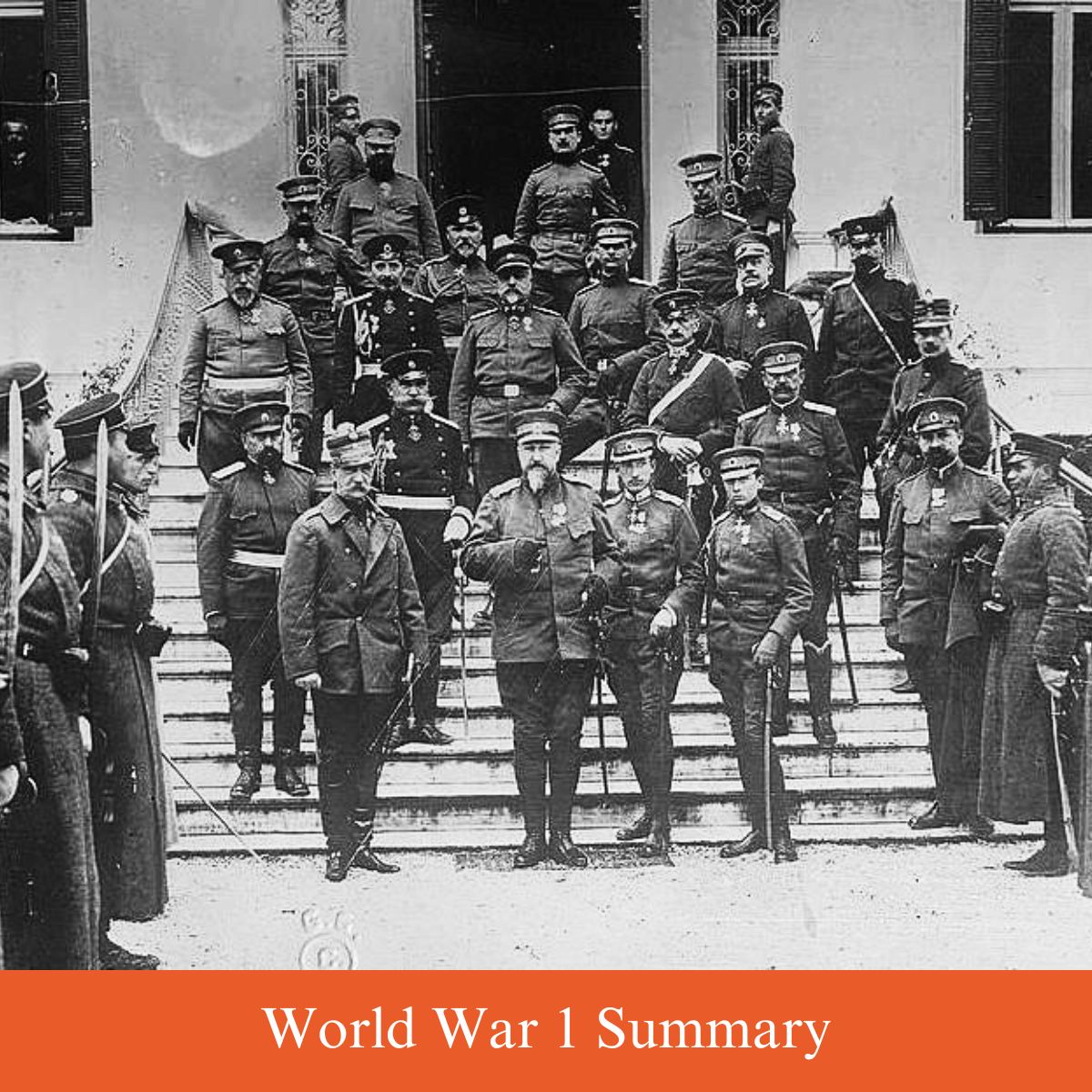World War 1 was known as the Great War and was a global war that originated in Europe and would eventually consume many nations throughout the world. It lasted from July 29, 1914, to November 11, 1918, and led to more than 70 million military personnel being deployed throughout the world.

It was one of the largest wars in history and also one of the deadliest. Nine million combatants and seven million civilians died as a direct result of the war. Other genocides and the 1918 influenza pandemic caused at least 50 million more deaths.
Cause
On 28 June 1914, Gavrilo Princip, a Bosnian Serb Yugoslav nationalist, assassinated the Austro-Hungarian heir Archduke Franz Ferdinand in Sarajevo, leading to the July Crisis.
In response, on 23 July, Austria-Hungary issued an ultimatum to Serbia. Serbia's reply failed to satisfy the Austrians, and the two moved to a war footing.
While this may be one of the common beliefs for the cause of World War 1, it is still debated.
Alliances
Tensions had been rising throughout Europe with various arms races and alliances.
The great powers of Europe were divided into two coalitions:
Triple Entente: Consisted of France, Russia, and Britain
Triple Alliance: Germany, Austria-Hungary, and Italy.
These alliances caused a domino effect when Germany declared war on France and began to march through Belgium. Within weeks, the entire continent had declared war.
The Dominoes Fall
Germany fought the war on two fronts against France and Russia.
Their initial idea was to use the bulk of their army on the western front and defeat France in 4 weeks before Russia could mobilize. This plan would become known as the Schlieffen Plan.
An essential element of this plan was to gain free passage through Belgium to pounce on France quickly, but Belgium refused to give them passage, which Germany invaded.
The invasion set off a chain of events that led to France and Great Britain declaring war on Germany by August 4, 1914.
Eight days later, France and Britain declared war on Austria-Hungary.
August 23rd, Japan sided with the Entente and began seizing German possessions in China and the Pacific.
In November 1914, the Ottoman Empire entered the war on the side of the Alliance, which opened a front in the Caucasus, Mesopotamia, and the Sinai Peninsula.
European colonial empires also became vulnerable, which spread the conflict into the continent of Africa, the Indian Ocean, and across the globe.
The Entente and its allies would become known as the Allied powers, while Germany, Austria-Hungary, and their allies became known as the Central Powers.
The Kingdom of Bulgaria joined the Central Powers in 1915.
The Kingdom of Greece joined the Allied Powers in 1917.
3 years later, Germany attempted to incite Mexico to attack the United States. The attempt failed, and the United States would enter the war in 1917. This would become a major issue for the United States during the Election of 1916 and eventually the Election of 1920.
The Fighting
Germany's advance was halted at the First Battle of the Marne, and by the end of 1914, the war became one of attrition. Long trench lines were created, and the battle lines did not change much until 1917.
Russia began to have internal problems. The February Revolution replaced the Tsarist autocracy with the Provisional Government. Discontent from the war grew and led to the October Revolution, which created the Soviet Socialist Republic. This caused Russia to exit World War 1.
This allowed the transfer of large numbers of German troops from the East to the Western Front, resulting in the German March 1918 Offensive
This offensive was initially successful, but the Allies rallied and drove the Germans back in their Hundred Days Offensive.
Bulgaria was the first Central Power to sign an armistice, the Armistice of Salonica, on September 29, 1918. On October 30, the Ottoman Empire capitulated, signing the Armistice of Mudros.
On 4 November, the Austro-Hungarian empire agreed to the Armistice of Villa Giusti.
With its allies defeated, the revolution at home, and the military no longer willing to fight, Kaiser Wilhelm abdicated on November 9, and Germany signed an armistice on November 11, 1918.
World War I was a significant turning point in the political, cultural, economic, and social climate of the world. The war and its immediate aftermath sparked numerous revolutions and uprisings.
The Big Four (Britain, France, the United States, and Italy) imposed their terms on the defeated powers in a series of treaties agreed at the 1919 Paris Peace Conference, the most well-known to be the German peace treaty, the Treaty of Versailles.
Related Article: World War 1 Timeline
